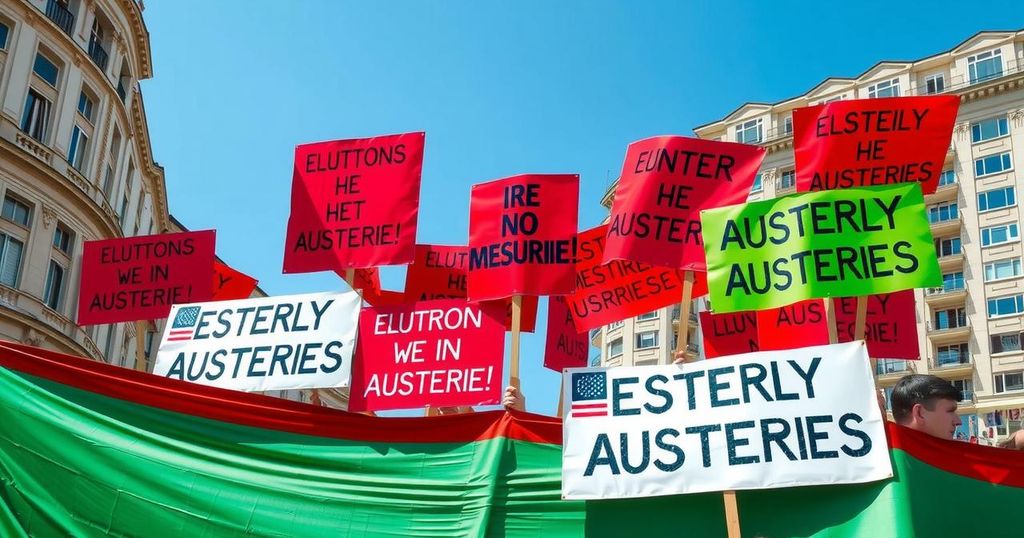President Javier Milei claims inflation will end by mid-2024 while unions protest austerity cuts that harm workers’ incomes. His fiscal policies have led to some reduction in annual inflation, yet dissatisfaction among labor groups is growing. Demonstrations against austerity measures may threaten the government’s plans moving forwards as political tensions rise amid economic challenges.
In a recent and somewhat audacious statement, President Javier Milei proclaimed his administration as “the best in Argentina’s history,” insisting that inflation will be eradicated by mid-next year. This announcement, made during the EXPO EFI 2025 event in Buenos Aires, comes amidst mounting discontent from labor unions regarding the government’s strict austerity measures, which many claim have exacerbated the economic plight of millions.
During the event, Milei confidently asserted that “inflation has its sell-by date for the middle of next year and now is the time to think of growth,” emphasizing his belief that Argentina has emerged from a state of emergency. Although he acknowledged the challenges that remain, Milei was optimistic about the progress made, expressing satisfaction with the fiscal outcomes of his government.
Milei also applauded the recent partial removal of currency and capital controls that had been in effect since 2019, describing these restrictions as a “monstrous tool” that undermines economic stability. In addition, he discussed his administration’s agreement with the International Monetary Fund, criticizing detractors who doubted his ability to secure such a deal.
However, shortly after Milei’s speech, union leaders mobilized thousands in a demonstration against the austerity policies. The protest, held on the eve of Labour Day, was largely peaceful but resulted in 14 arrests. Participants, brandishing union banners and anti-austerity placards, voiced their dissatisfaction with the government’s economic decisions, organized by CGT, the nation’s most influential labor federation. They accused the administration of ignoring workers’ grievances while imposing harsh cutbacks that diminish living standards.
In a further indication of unrest, the UTA transport union announced a bus strike scheduled for May 6, following failed negotiations regarding wage increases. The government, aiming to curb inflation, has instituted a one-percent cap on monthly wage bargaining, even as inflation spiked to 3.7 percent in March, foreshadowing a potentially turbulent economic climate leading up to the upcoming midterm elections.
At the CGT rally, Father Lorenzo ‘Toto’ de Vedia echoed the frustrations of low-income residents, stating that the absence of effective state support has created a “vacuum” now filled by organized crime. One protestor, who wished to remain anonymous, voiced the sentiment felt by many, stating, “Nobody can reach the end of the month. There is so much inequality.”
Since assuming office in December 2023, Milei’s austerity measures have reportedly cut public spending by 4.7 percent of the Gross Domestic Product, according to data from the Instituto Argentino de Análisis Fiscal (IARAF). Though this led to a reduction in annual inflation from 211 percent in 2023 to 118 percent in 2024, current monthly price increases remain between two and four percent.
Milei’s remarks at the EXPO EFI event, however, neglected to mention the CGT protests or the realities faced by ordinary citizens. Instead, he boasted of a 30-percent state size reduction and dismissed social concerns. Political analyst Artemio López cautioned that the social condition in Argentina is dire, indicating that income distribution is at its lowest in two decades.
Amidst the growing unrest, pensioner organizations also protested outside Congress later that same day, further complicating traffic in the area, while authorities implemented measures to adhere to Security Minister Patricia Bullrich’s guidelines against picketing.
In summary, President Javier Milei’s bold inflation timeline arrives amid significant union unrest and protests against austerity measures. While Milei remains optimistic about fiscal results, critics highlight the increasing dissatisfaction among workers and the severe economic challenges faced by many Argentinians. Unions and other groups continue to voice their grievances, indicating that the president’s ambitious plans may face formidable opposition moving forward. The situation demonstrates a complex intersection between governmental financial strategy and the daily struggles of the populace, warranting close observation as the upcoming midterm elections loom on the horizon.
Original Source: www.batimes.com.ar




